This week, our learners dug deeper into different kinds of love. We started with this bit of text: “All love that depends on something, [when the] thing stops, [the] love stops; and [all love] that does not depend on anything, will never stop” (Pirkei Avot 5:16).
In Garinim (kindergarteners), kiddos answered a few questions:
What are some people or things that you love?
- Makom Community
- My grandparents’ puppy
- Myself
- My friends
- School
- My teachers
- Mommy and daddy
What are some things you love unconditionally, no matter what, dependent on nothing?
- French fries
- Chuck E Cheese
- The Franklin Institute
- My whole entire family
- My parents
- My grandma
What are some things you love conditionally?
- I love going to Universal, but really only the water park. If I couldn’t go to the water park, then I wouldn’t love it.
- I love my mom but mostly just when she’s not mad.
- I think my mom maybe doesn’t love me when she’s mad at me.
On Wednesday, we explored how love might shift from conditional to unconditional or otherwise change and grow over our lives. We read two different versions of The Giving Tree as an example of a loving relationship that developed over a whole lifetime. First we reflected on how people can change as individuals as they get older.
When people grow up they…
- Get more serious and less playful.
- Sometimes get greedy.
- Get tired more quickly.
- Work a lot.
- Get stronger and then get weaker.
- Start to miss their family and friends as the people they love start dying.
We noticed that the tree’s love for the Boy seemed unconditional – she was ready and willing to give everything from herself to him no matter what. We wondered, however, whether the boy would have continued to love the tree if she hadn’t been able to give him so much. We felt sad at the end when the tree had run out of things to give.
Then we looked at a different version of the story where the tree set some boundaries. She stopped giving away parts of herself when the Boy asked for her branches, and instead asked him to please show some care for her and her wellbeing too. The tree clearly still loved the Boy, and in fact it became clearer that the Boy loved the tree too after the tree said “no” to him. We reflected on how unconditionally loving relationships don’t have to involve unconditionally giving ourselves away.
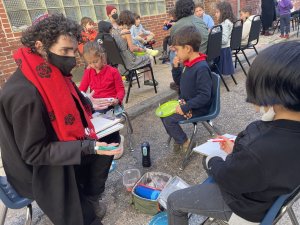
On Monday, Shorashim (1st and 2nd graders) discussed conditional and unconditional love. “Cats” and “grandparents” came up as examples of objects of our unconditional love. In fact, one person noted that they loved their cats even though they were allergic to them. We talked about what “love” is, and what words we associate with love:
- Gentle
- Really like a lot
- Hugs and kisses
- The Robert Indiana “LOVE Statue”
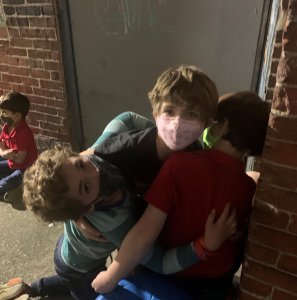
On Tuesday, we considered how to love people in difficult moments. We read the book The Invisible String, which proposes that we are connected to people we love by an invisible string even when we aren’t feeling close to them. Learners suggested that another strategy to feel connected to someone is to remember good moments with them. However, learners felt that with a friend or a neighbor, it’s different than with a family member. Learners also noted that it can be difficult to set boundaries with people you love unconditionally, and that in addition to tochecha, kindly scolding or disagreeing, strategies for conflict while maintaining love include
- Using “I statements”
- Not talking to someone
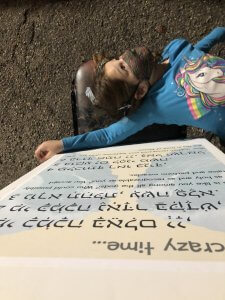
On Wednesday, we read The Forever Garden and reflected on how love changes over time and how it stays the same. We noted that with things that we love, it is more likely that those would change than with people. Some of those things include:
- Swimming
- Dancing
- Cats
- Snuggling
- Camp
- Reading
- Karate
- Sesame Street
- Milk
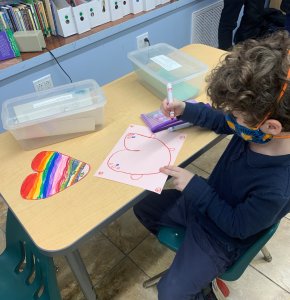
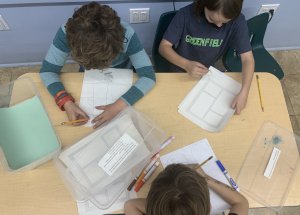
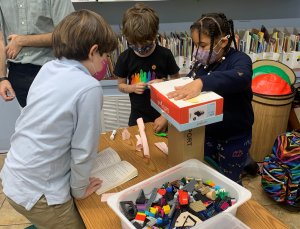
Nitzanim (3rd, 4th, and 5th graders) kicked off our week exploring more Pirkei Avot! This week, our discussions were guided by themes of love and what it means for love to depend on something. Each learner took a minute to describe someone – human or animal – that they feel they love unconditionally! These included…
- Mom
- Cats
- Bearded dragon
- Family
We then discussed what it meant for our love to depend on something. Here are some things that kiddos shared their love might depend on:
- The presence of the other person: how often they are around can affect our love for them
- The way someone else treats us can impact the way we love them
On Tuesday, some of our kiddos came up with skits to demonstrate conditional vs. unconditional love. They gave passionate performances involving animals and a situation with detention at school. We loved their energy! We also discussed how setting boundaries is a part of showing love in our relationships with friends and family. Here were some of our reflections:
- We can set boundaries with friends, like sharing a secret and telling them not to share with others
- Boundaries can be broken if the other person is not honest
- Lying and sharing secrets without permission makes it harder to have trust in these relationships
Nitzanim has been working so, so hard and has completed our mural and audio recording!
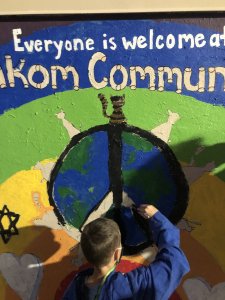
Next week, we will review our Love Your Neighbor Unit with a Jeopardy Game, Nitzanim will be presenting their Showcase, and we will start creating our classroom brit (two-way promise). We are bursting with anticipation!
